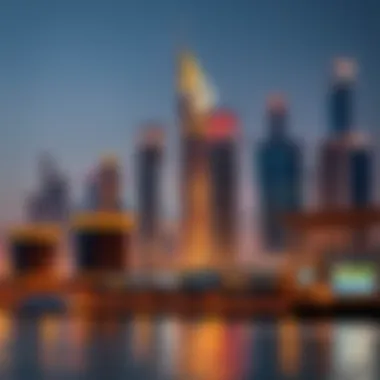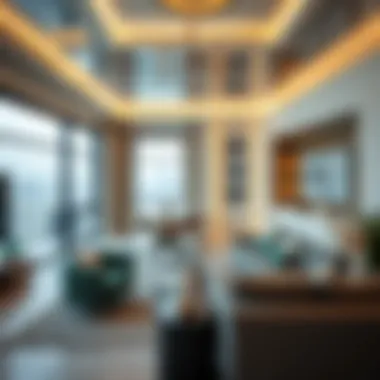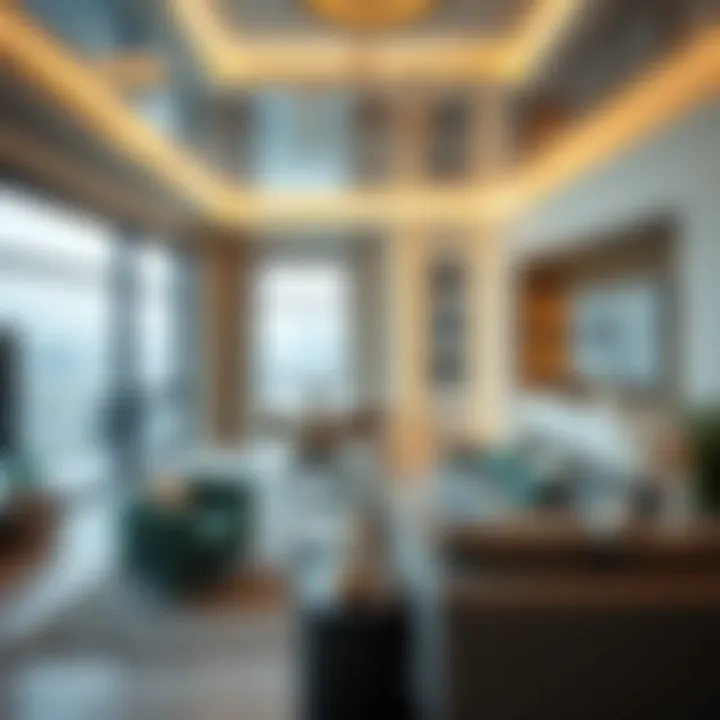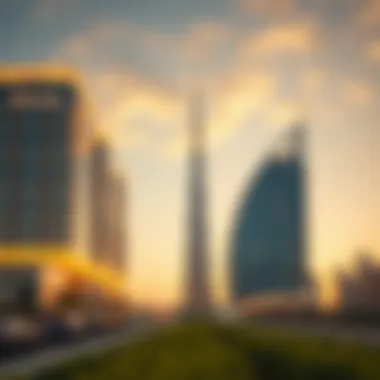Top Gulf Developments Shaping Dubai's Real Estate


Intro
Dubai's Gulf region is equal parts ambition and innovation, a melting pot where luxury meets function. The real estate landscape in this glittering metropolis is ever-evolving, marked by its unique collection of architectural splendors and phenomenal investment opportunities. With an influx of investors and a steady stream of diverse projects, understanding the pulse of this vibrant market can feel like diving into a whirlwind.
From futuristic towers like the Burj Khalifa to sprawling waterfront developments, the city's skyline is a testament to human ingenuity and enterprise. Buyers and investors alike are increasingly drawn to Dubai's promise, fuelled by continuous growth, impeccable design, and increasing urbanization. There's no denying that in a world where change is the only constant, Dubai stands at the forefront, guiding the future of real estate in the Gulf region.
In this article, we dissect the essential aspects of Dubai's real estate developments. We will traverse through key points including current market trends, price trends, and strategic investment insights tailored for prospective buyers and seasoned investors. As we peel back the layers of this dynamic market, we aim to provide a roadmap for anyone looking to navigate the intricacies of buying property in this buzzing locale.
Property Market Analysis
Current Market Trends
As of the latest reports, Dubai's property market is showing some promising signs. The surge in demand for both residential and commercial properties has been particularly pronounced. Preferences are shifting; buyers now lean towards sustainability and innovative designs, making eco-friendly developments increasingly favored.
Moreover, shifting demographics and the rising influx of skilled expatriates have triggered a robust demand for housing. The government’s policies aimed at enhancing owner-occupier appeal have also significantly contributed to market attractiveness. The introduction of long-term visas and simplified propert ownership regulations opens up an appealing landscape for both local and foreign investors alike.
Price Fluctuations and Insights
Price fluctuations in Dubai's property market have been notable, driven by a myriad of factors. As the economy rebounds, we’ve seen a slight uptick in property values, with luxury apartments and villas at the forefront of this resurgence. Recent trends indicate that top-tier properties have experienced price growth of around 5% to 10% over the past year, making them hot commodities in the eyes of high-net-worth individuals.
Yet, one must remain vigilant; while some areas flourish, others still grapple with oversupply, leading to more competitive pricing. Being informed about these nuances is crucial for anyone looking into this market.
Investment Opportunities
Key Areas for Property Investment
For those eyeing prime investment, certain districts in Dubai come highly recommended.
- Dubai Marina: Renowned for its stunning waterfront views and luxurious lifestyle, it's a favorite among expatriates.
- Downtown Dubai: Centered around the Burj Khalifa, real estate here boasts both prestige and value growth.
- Dubai Hills Estate: This master-planned community offers a blend of residential and commercial spaces, appealing to families and investors alike.
- Palm Jumeirah: An iconic location, properties here promise remarkable rental yields due to their exclusivity and allure as a tourist destination.
Investors should keep a keen eye on developing areas that hint at future growth, such as Dubai South, which stands to benefit from the expansion of the Expo 2020 site into a long-reaching urban area.
Tips for First-Time Investors
- Research Extensively: Knowledge is power in real estate; familiarize yourself with local regulations.
- Utilize Expert Advice: Connect with real estate agents or consultants who know the lay of the land well.
- Visit Properties in Person: Digital views are no substitute for an actual walkthrough.
- Evaluate Market Conditions: Keep up to date with price trends and economic forecasts to make informed decisions.
"Investing in Dubai's real estate isn’t just about buying properties; it's about securing a lifestyle and future in one of the most dynamic cities in the world."
By aligning with these insights, potential investors can navigate the bustling arena of Dubai's real estate with confidence, embracing the opportunities waiting within this remarkable landscape.
Prelims to Dubai's Gulf Real Estate Market
The Gulf region, particularly Dubai, has risen like a phoenix in the real estate sector, becoming a focal point for investors, developers, and buyers worldwide. The importance of understanding the Dubai Gulf real estate market cannot be overstated. It presents a dynamic, ever-evolving landscape where innovation meets tradition, catering to a diverse array of needs and aspirations.
Dubai's unique geography and strategic location blend seamlessly with its ambitious vision for growth. This makes the city an enticing destination not just for residents but also for those looking to invest. With a booming economy and a government keen on enhancing its infrastructure, Dubai offers significant opportunities for property investment.
Key Elements of the Market
- Diverse Offerings: From luxury apartments in iconic skyscrapers to sleek villas by the waterfront, the variety of properties available caters to different preferences and budgets. Developers are constantly pushing the envelope, creating environments that blend urban living with nature, which is becoming increasingly sought-after.
- Regulatory Support: The government has laid down a solid framework to protect both local and foreign investors. Initiatives aimed at simplifying property ownership and ensuring transparency have played a vital role in attracting international buyers. Notably, the introduction of long-term visas for investors further bolsters confidence in the market.
- Technological Advancements: Smart home technologies are not merely trends but are becoming standard fixtures in new developments. Enhanced connectivity and integration signify the future of living in Dubai, where a digital lifestyle is embraced alongside luxury and convenience.
Benefits of Engaging with the Market
Engaging with the Dubai property market offers substantial benefits:
- High Returns on Investments: Investing in real estate here could yield high rental returns, particularly in prime locations such as Dubai Marina or Palm Jumeirah where demand continues to surge.
- Cultural and Recreational Appeal: Dubai’s vibrant cultural scene, coupled with world-class amenities such as shopping malls, restaurants, and leisure activities, makes it an attractive place to live and work. This lifestyle appeal adds another layer of desirability to investments.
- Stable Economic Environment: Despite global uncertainties, Dubai's economy has demonstrated resilience. A diversified economy with sectors such as tourism, trade, and finance supports the stability of its real estate market.
In light of these considerations, the following sections of this article will delve deeper into specific Gulf developments, innovative architectural designs, and the complexities of navigating this robust market. Stay tuned to explore how these factors contribute to an unparalleled investment landscape.
Key Features of Top Gulf Developments
Dubai's Gulf developments are not just about attractive buildings; they're a microcosm of luxury, functionality, and innovation. These features shape the real estate market, making it crucial for investors and buyers to grasp their significance. Each aspect plays a vital role in setting expectations for what potential buyers might seek in their quest for properties that offer more than just a roof over their heads.
Architectural Innovations
Signature Design Elements
The architectural creativity flowing through Dubai is outstanding. Structures like the Burj Khalifa and the upcoming Dubai Creek Tower exemplify Signature Design Elements. These unique aesthetics add distinction in a saturated market, attracting both local and international investors. The use of bold shapes and cutting-edge materials not only makes even the most mundane building a spectacle but also pushes the boundaries of traditional design. A main allure is how these designs can increase property value and boost community status. However, potential downsides include higher construction costs, potentially culminating in inflated real estate prices.
Sustainable Architecture
Sustainable Architecture is gaining traction, driven by the global climate narrative and a local commitment to green solutions. Developments like The Sustainable City showcase how ecological considerations can be weaved into stunning designs. Using solar panels, energy-efficient systems, and recycled materials reduces the environmental footprint while fostering a healthier lifestyle. Plus, eco-friendly properties not only attract like-minded buyers but can also fetch premium pricing. However, balancing sustainability with aesthetics is a tricky tightrope walk, often leading to compromises that might not satisfy everyone.
Smart Home Technologies
In today’s fast-paced world, Smart Home Technologies set developments apart from standard offerings. Installations like intelligent lighting systems and home automation can make living spaces feel more luxurious and, indeed, convenient. They enhance security and efficiency while appealing to tech-savvy buyers searching for modern lifestyles. The flip side? Some buyers may find these high-tech solutions intimidating or unnecessary, leading to mixed sentiments about their desirability. Yet, for many, the ease of controlling home functions remotely becomes a major selling point.
Luxury Amenities and Lifestyle Offerings
Exclusive Facilities
Exclusive Facilities like rooftop pools, state-of-the-art gyms, and private cinema rooms elevate the living experience. These amenities are no longer seen as frills but rather as essentials that attract buyers searching for a lifestyle, not just a home. Developments like Jumeirah Beach Residence offer vibrant communal spaces where social interaction thrives. Such spaces foster a sense of community and exclusivity, but the challenge lies in maintaining these facilities regularly to ensure they meet residents' expectations and demands.


Community Living Experience
The Community Living Experience is becoming a primary consideration for many buyers. Developments emphasizing this aspect can greatly influence purchasing decisions, as many people now prefer living in a space that fosters social ties. Neighborhoods designed with ample parks, walking trails, and family facilities empower social interactions and create bonds among residents. However, striking the right balance between community and privacy can be difficult, leading to potential tension among residents with varied lifestyles.
Integrating Nature with Urban Life
Finally, Integrating Nature with Urban Life resonates with many who yearn for an oasis within the bustling city. Parks, green roofs, and landscaped gardens within developments not only enhance aesthetics but also improve mental health and well-being. The vision behind these integrations is clear: provide urban dwellers the tranquility of nature without straying far from city conveniences. Still, achieving this balance requires careful planning and ongoing maintenance, and not every project may succeed fully in this ambitious goal.
As urbanization continues, the push for integrating nature into real estate developments will likely become a defining factor in buyer decisions.
These Key Features serve as the backbone of Dubai's GPA developments, revealing trends, lifestyle preferences, and investor priorities. Understanding these elements equips buyers and investors with the necessary insights to navigate this dynamic landscape effectively.
Prominent Locations for Development
When it comes to the Dubai real estate landscape, certain locales have carved out a niche that’s hard to ignore. These prominent locations for development offer not just property, but a lifestyle intertwined with culture, luxury, and growth potential. Knowing these areas can make all the difference for investors, buyers, and developers. The importance of these locations shines through their unique appeal and their ability to attract a mix of local and foreign investment.
Dubai Marina
Residential Complexes
Dubai Marina is a bustling area that presents a lively waterfront community. Residential complexes in this area are known for their towering skyscrapers and stunning views of the Arabian Gulf. One of the remarkable aspects is the way these complexes are designed to promote connectivity and community interaction. Many of the buildings come equipped with modern amenities such as pools, gyms, and children's play areas.
The key characteristic of these residential complexes is their luxury lifestyle appeal. Units often boast high-end finishes, smart home features, and spacious layouts that cater to both families and singles. This makes them a popular choice for those looking to invest in a high-demand area of Dubai.
A unique feature of the residential complexes in Dubai Marina is the access to waterfront activities, such as yachting and water sports, which enhances the living experience. However, potential buyers must be mindful of the high price points associated with these properties, as they reflect the premium lifestyle offered.
Investment Returns
In terms of investment returns, Dubai Marina stands out. The area has historically exhibited strong rental yields, with many properties providing consistent cash flow for landlords. This characteristic draws many investors looking to secure their stake in Dubai’s flourishing real estate.
What amplifies the appeal is the proximity to key attractions like JBR and the Walk, which help in sustaining a high rental demand. However, while the returns can be enticing, fluctuations in property values due to market volatility might present risks that investors need to consider carefully.
Palm Jumeirah
Iconic Properties
Next up is the famous Palm Jumeirah, known for its iconic properties and stunning design that resembles a palm tree from above. The properties here are synonymous with luxury, boasting lavish villas, high-end apartments, and beachfront access. The significance of these properties lies in their exclusive nature and the unique lifestyle they offer.
A key characteristic of the properties on Palm Jumeirah is their architectural aesthetics and state-of-the-art amenities. Residents enjoy breathtaking views and private spaces that foster a sense of sanctuary. Due to their nature, these properties are often seen as status symbols, making them a beneficial choice for high-net-worth individuals.
On the flip side, the high maintenance costs and ongoing property fees can be drawbacks. Nonetheless, owning an iconic property there is often viewed as an impressive investment.
Tourism and Hospitality Impact
The impact of tourism and hospitality on Palm Jumeirah is substantial. This area is a hotspot for tourists, thanks in part to renowned hotel chains like Atlantis The Palm. It not only boosts the local economy but also enhances property values in the vicinity. Tourists visiting for leisure and relaxation contribute to a thriving hospitality sector, resulting in increased rental demand.
The unique feature of this area's hospitality is that it combines luxury with an active social scene. This aspect can create a steady stream of visitors looking for short-term rentals, providing property owners with additional income opportunities. However, a dependency on tourism can sometimes fluctuate, presenting challenges during quieter periods.
Downtown Dubai
Commercial and Residential Synergy
Moving on to Downtown Dubai, the blend of commercial and residential spaces is unmatched. This area's synergy is evident in its bustling atmosphere, as it serves both as a business hub and a vibrant living community. The presence of the Burj Khalifa, a symbol of modern architecture, adds to its prestige.
This unique integration encourages a mix of demographics. Young professionals flock to the residential towers, while businesses claim office spaces close to key amenities. The key characteristic here is the ability to work and live within walking distance, making it a popular choice among those prioritizing convenience.
One unique aspect of this synergy is the cultural offerings, like art galleries and public events that enrich the community feel. Nonetheless, potential buyers should remain cautious of high prices in this coveted area, which might hinder first-time buyer entry.
Cultural Landmarks
Finally, we can't overlook the cultural landmarks that define Downtown Dubai. Places like the Dubai Opera and the Dubai Mall are more than just attractions; they serve as cultural touchstones that enhance the overall allure of the area. These landmarks contribute to an enriched lifestyle for residents and boost tourism.
The value proposition here is clear: residents enjoy easy access to cultural and social experiences, fostering a vibrant community spirit. One major advantage is the potential for increased property appreciation due to the ongoing development of cultural projects. However, the fast-paced growth can lead to construction noise and temporary inconveniences that some may find detrimental.
In summary, understanding these prominent locations in Dubai provides crucial insights for those looking to invest, live, or operate within this dynamic market. Each area presents its own strengths and considerations, making informed decisions key to success.
Market Trends Influencing Development
Understanding the current market trends is crucial for anyone looking to navigate the rapidly evolving real estate sector in Dubai. The dynamic nature of the Gulf developments is shaped by various factors that affect buyer behavior, investment decisions, and overall market health. Aspects like the resurgence from the pandemic and an unabated interest from foreign investors play a pivotal role in crafting the landscape of Dubai's real estate. Keeping an eye on these trends allows investors and buyers to anticipate market swings, ensuring they make informed decisions.
Post-Pandemic Recovery
Shifts in Buyer Preferences
The aftermath of the pandemic has significantly altered how buyers perceive real estate investments. One remarkable shift is the growing appetite for spacious properties. Individuals now gravitate towards larger homes that offer multifunctional spaces suitable for both work and leisure. This preference for more room over compact living arrangements stems from an increased emphasis on comfort and a better quality of life.
Another distinctive characteristic is the move towards suburban areas as opposed to the bustling city center. These locations often provide a more family-friendly environment with amenities that cater to a slower pace of life. Consequently, properties in these regions are not only becoming more sought-after but are also likely to appreciate in value over time. In this context, buyers find joy in acquiring a residence that aligns with their newly shaped lifestyles, making it a smart and fulfilling choice in today’s market.
"The pandemic taught buyers the importance of nurturing their home environment. Spaciousness is now king, and having amenities becomes paramount."
Remote Work Impact


The surge in remote work due to the Covid-19 pandemic has also influenced development trends. Many companies have shifted to hybrid models or fully remote teams, allowing employees to consider where they live more freely. This newfound flexibility has led to a change in demand for properties that offer home-office setups or local co-working spaces.
Highlighting this trend, many developers are now integrating office-like features into residential properties, catering to professionals who require a dedicated workspace without sacrificing comfort. Homebuyers appreciate properties with quiet study areas, fast internet access, and proximity to amenities that facilitate a work-life balance. The distinct feature of such developments is their ability to blend residential comfort with professional needs, providing a lifestyle that supports remote working—truly a beneficial alignment in today’s real estate landscape.
Foreign Investment Surge
Attraction of International Buyers
Dubai has consistently attracted international investment, and this trend has only gained momentum post-pandemic. People are looking beyond their borders for real estate opportunities, and Dubai stands out for its welcoming environment and high return on investment potential. Investors are particularly drawn to the easy property purchasing process, which has been streamlined to accommodate foreign buyers.
The key characteristic of this trend is the enticing market dynamics that Dubai offers, including favorable property laws and tax advantages. As a result, there’s a noticeable surge in non-resident ownership, making it a natural choice for those looking to diversify their portfolios globally. However, investors must be cautious as market volatility can pose risks, necessitating thorough research and due diligence in their decision-making process.
Government Initiatives
The Emirati government’s efforts to stimulate the real estate sector are key to fostering foreign investment. One significant initiative is the introduction of long-term visas for property investors, which enhances the country's appeal as a destination for expatriate living. These initiatives not only bolster investor confidence but also solidify Dubai’s status as a leading global real estate hub.
Additionally, the government has rolled out various incentives tailored to attract international investors—such as reduced fees for property registration and simplified bureaucratic processes. These unique features make Dubai a timely choice for those who are serious about investing in real estate. Amidst global uncertainties, these government endorsements provide a cushion, reassuring investors of potential growth in the future.
In summary, the market trends in Dubai's Gulf developments reveal a shifting landscape influenced by changing buyer preferences, remote work dynamics, foreign investments, and supportive government policies. By understanding these trends, investors can make well-rounded decisions that maximize their financial potential in this vibrant real estate market.
Investment Opportunities in Dubai's Gulf Developments
Investment in Dubai's Gulf developments is a hot topic in today's real estate landscape. Investors and buyers are increasingly looking for ways to capitalize on the area's growth potential. This topic is crucial because it not only addresses the current real estate market dynamics but also highlights the long-term prospects for various types of properties. The Gulf developments in Dubai present a unique blend of luxury, innovation, and demand that makes them particularly attractive to both local and international investors.
Residential Investments
High-Yield Rental Markets
High-yield rental markets in Dubai are the golden egg of the real estate sector. Investors are particularly drawn to these areas due to the significant returns they can yield. The unique characteristic of these high-yield markets is their ability to provide landlords with consistent cash flow. Areas like Dubai Marina and Downtown Dubai are shining examples, where rental yields often exceed 7%, which is enviable compared to many other global cities.
Moreover, the demand for housing remains buoyant, fueled by a mix of expatriate influx and tourism. This phenomenon turns residential properties into valuable investment assets. The advantage here is obvious: a steady influx of renters ensures that landlords can maintain occupancy rates and avoid the slack periods that can plague other markets. But it’s not without its challenges, as the market's volatility can impact prices significantly, making it vital for investors to stay informed.
Property Management Insights
Understanding property management is essential for anyone diving into Dubai’s real estate investment. Preferred property management services streamline the operation of rental properties for owners, optimizing the overall return on investment. The key characteristic of effective property management lies in tenant relations and maintenance; a well-managed property retains tenants and thereby prolongs rental income.
However, there’s a unique feature to consider: the ability of management firms to implement modern technology solutions. Things like tenant portals and automated maintenance requests enhance the experience for both property owners and renters.
While property management can help mitigate risks, it does come with its own set of disadvantages, like the associated fees that can eat into profits. Yet, when handled well, these insights can transform a basic investment into a thriving cash-generating machine.
Commercial Investments
Retail vs. Office Space Investments
As the commercial aspect of Dubai's real estate market evolves, the debate over retail versus office space investments takes center stage. Retail investments often receive attention due to consumer trends shifting toward e-commerce, yet there’s still a substantial demand for well-located retail properties. The key characteristic of retail space is its reliance on foot traffic and consumer interactions, which are crucial for success.
On the flip side, office spaces have seen a renaissance as companies adapt to hybrid work models. There’s a growing interest in making work environments more productive and appealing. Investments in either sector need an understanding of local market trends: while retail might seem risky today, well-situated spaces can yield impressive returns. One must remain cautious, as market conditions can drive demand fluctuations in both sectors.
Trends in Co-Working Spaces
The rise of co-working spaces signals considerable change in Dubai's commercial landscape. Organizations and freelancers are increasingly opting for flexible working arrangements, making co-working spaces a viable investment opportunity. The unique characteristic of co-working spaces is their ability to foster community networking, which can drive collaborative business initiatives.
Investors benefit from lower operational costs compared to traditional office setups, which can be a boon in terms of returns on investment. However, it’s vital to be cautious as the market becomes saturated. Balancing quality and affordability will determine success in a trend that's continually involving.
In summary, investors should focus on high-yield opportunities in residential sectors and monitor commercial trends, particularly in co-working and flexible spaces. Knowledge is key to unlocking the potential in Dubai's dynamic real estate market.
For more insights, explore resources like Wikipedia and Investopedia to tap into broader market trends and property management insights.
Regulatory Framework and Legal Considerations
The regulatory framework surrounding Dubai's real estate market plays a crucial role in fostering trust and stability for both domestic and international investors. Understanding the legal landscape is essential, as it greatly influences investment decisions. Clear and transparent property laws can pave the way for smoother transactions and can also help to alleviate any potential fears foreign buyers might have regarding ownership and rights. Overall, knowing the rules helps in making informed decisions that align with both investment goals and personal needs.
Understanding Property Laws
Freehold vs. Leasehold Properties
One of the first concepts potential investors should grasp is the difference between freehold and leasehold properties. Freehold properties allow the owner to possess the land and the building on it outright. This means total ownership, and with it comes the freedom to modify the property as they see fit. In contrast, leasehold properties are leased for a set term—typically up to 99 years—and the buyer essentially owns the property but not the land it rests on.
Key characteristics of freehold properties make them a beneficial choice for long-term investment. They are often seen as a valuable asset, particularly when it comes to resale value. Moreover, buyers feel a deeper connection to the property because they have more control over its future.
Unique features of leasehold can sometimes contribute to a sense of uncertainty, especially for foreign buyers who may wonder about rights after the lease term expires. Although leasehold property can serve as a more affordable entry point into the market, understanding the specific terms and conditions is paramount to avoid complications down the line.
Investor Rights and Obligations
Understanding Investor Rights and Obligations
When investing in Dubai's real estate market, knowing investor rights and obligations is equally important. Each buyer has the right to the transparency of information regarding the property, including zoning laws, permits, and property condition.
Key characteristics of these rights empower investors, providing peace of mind that they can easily access the necessary documentation to make informed decisions. They will also enjoy a sense of security in property ownership.
Unique features manifest in obligations as well. For example, maintaining the property and adhering to community regulations falls under the buyer's responsibilities. Understanding what these entail is vital in cultivating a pleasant living or rental experience—for both the investor and the community at large.


Navigating Real Estate Procedures
Buying Process for Foreign Investors
For foreign investors, understanding the buying process in Dubai can often feel like navigating a maze. However, it's quite straightforward once you grasp the essential steps involved. Typically, it begins with selecting a property and then securing a No Objection Certificate (NOC) from the developer.
Key characteristics of this process, such as knowing the types of properties available for purchase, significantly enhances the investment experience. Whether purchasing freehold or leasehold, knowing how to proceed allows for more efficient transactions.
Unique features include the ability to purchase properties in designated freehold areas, which opens many opportunities for those looking to invest in Dubai. However, understanding local customs can help speed things along and avoid roadblocks.
Documentation Requirements
The documentation requirements represent another vital aspect of the real estate investment landscape in Dubai. Investors must gather the appropriate papers, which commonly include proof of identity, proof of funds, and a property sale agreement.
Key characteristics of these requirements help streamline the purchasing process. Having proper documentation ready ensures that potential buyers can move quickly when an appealing property comes on the market.
Unique features can be found in the various regulations pertaining to foreign investors, often requiring additional steps that can confuse newcomers. Understanding these unique features is essential for having a seamless and successful acquisition.
Being knowledgeable about these factors can not only save you time but potentially save you money as well.
In summary, the regulatory framework is an essential component of the Dubai real estate landscape. Understanding property laws, navigating the buying process, and being aware of documentation requirements and investor rights can significantly empower investors. By adopting a well-informed approach, buyers can navigate the complexities of this market with precision and confidence.
Challenges Facing the Dubai Real Estate Market
The Dubai real estate market has always been a hotbed of activity, attracting both investors and buyers from every corner of the globe. However, the sector is not without its hurdles. Understanding these challenges is crucial for anyone looking to navigate this dynamic landscape. This section highlights specific issues that could impact investment decisions and real estate strategies. The challenges are as varied as they are significant, primarily stemming from market volatility and the ongoing need for sustainable development.
Market Volatility
Fluctuating Prices
Fluctuating prices in Dubai's real estate market can feel like riding a rollercoaster, with highs and lows that change as rapidly as the weather. One day a property might seem like a steal, only to skyrocket the next. This unpredictability poses a challenge for investors who seek stability and long-term gains. Price volatility can be influenced by numerous factors, including demand trends and the availability of financing.
A notable characteristic of fluctuating prices is that they can create opportunities for savvy investors. For instance, buyers may find a lower entry point during market dips, which could lead to substantial returns when the market rebounds. However, investor sentiment can swing quickly, leading to decisions made out of fear during downturns. High volatility could deter some from entering the market altogether.
"In real estate, timing can be everything. The correct insight into price fluctuations can lead to lucrative outcomes."
Impact of Global Events
The impact of global events on Dubai's real estate sector can often be like ripples in a pond—one event affects another, creating a chain reaction. Events such as geopolitical tensions, economic downturns, or health crises can cause stock market fluctuations which in turn affect buyer confidence. High-end properties may see a drop in demand when international buyers feel uncertain about their financial prospects due to global instability.
One key characteristic of global events is their immediacy; news travels fast, and reactions can be quick. This can create a rising tide of panic among investors, who may suddenly seek to sell their properties amidst fears of looming recessions or crises. For instance, the pandemic led to a brief slowdown in transactions, as many buyers took a step back to assess their situations. On the flip side, some markets saw opportunities arise, attracting new investment focused on recovery and adaptation.
Sustainable Development Challenges
Balancing Growth with Environmental Concerns
Balancing growth with environmental concerns stands as a monumental task in Dubai's real estate landscape. While the drive for growth is often fueled by a desire to develop iconic structures that symbolize modernity and luxury, this must be done without ignoring the repercussions for the environment. Ensuring that developments adhere to sustainability guidelines while simultaneously meeting the demands of rapid urbanization can create tension among stakeholders.
A unique feature of this balance is the growing integration of green building practices, which aims to reduce harm to the environment. There are numerous advantages, such as potential cost savings in energy consumption and increased property values for eco-friendly developments. However, the challenge remains in convincing investors to prioritize these practices when the upfront costs can appear higher compared to traditional construction methods.
Regulatory Compliance
Navigating regulatory compliance can be akin to finding one's way through a maze. Dubai's laws surrounding real estate transactions can appear complex and sometimes even daunting for inexperienced investors. The landscape shifts as regulations are updated to meet changing economic conditions and to adapt to the needs of its growing population.
A key characteristic of regulatory compliance is that it fosters a safer environment for investments. Strong laws breed investor confidence, but they also require diligence and understanding to navigate correctly. The challenge, however, lies in the potential for punitive measures if regulations are not met. Documents must be meticulously prepared, and timelines adhered to, demanding not just a financial investment but also a commitment to due diligence on part of the buyer or investor. By understanding these regulations, one can better leverage opportunities in the market without falling prey to legal troubles.
Future Outlook for Dubai's Gulf Developments
As Dubai’s real estate market continues to evolve, understanding the future outlook is imperative for investors and stakeholders alike. With rapid developments in technology and shifting buyer preferences, the landscape is poised for dynamic changes. The future outlook is significant as it informs strategic planning, investment decisions, and helps align with current market demands. Keeping an eye on emerging trends can provide insights into what’s next and how to maximize opportunities in this thriving sector.
Emerging Trends to Watch
Integration of Technology
One of the most notable aspects of today’s Gulf real estate developments is the integration of advanced technology. This includes smart home systems that promote energy efficiency and convenience. The characteristic of these technologies is their user-centric design, which focuses on enhancing the living experience for residents. With mobile apps that control lighting, temperature, and security, technology is not just a luxury but a necessity.
A unique feature of this technological shift is the incorporation of AI and IoT devices that enable seamless interaction between residents and their environment. The advantages of this trend are multifold: enhanced security, increased comfort, and often lower operating costs due to efficiency. However, there are challenges too, like data privacy concerns and the costs associated with implementing such sophisticated systems in new developments.
Shifts in Buyer Demographics
In addition to technological advancements, shifts in buyer demographics are shaping the future of Dubai's real estate market. Younger generations are now entering the housing market, increasingly valuing sustainability and community-oriented living spaces. One key characteristic of these emerging buyers is their emphasis on lifestyle over mere property ownership.
This demographic shift is significant because it signals a change in consumer preferences that many developers are beginning to recognize. Younger buyers often favor projects that incorporate green building practices and eco-friendly amenities. A unique aspect of this trend is the increasing demand for social spaces that encourage interaction and a sense of community. This shift can lead to benefits such as higher occupancy rates and stronger investment returns for properties that cater to these preferences.
Finale and Key Takeaways
Summarizing Market Insights
Summarizing market insights is crucial for making informed decisions. In this current landscape, buyers and investors need to tune in on key metrics like price trends, demand-supply ratios, and buyer sentiment. Highlighting these insights allows stakeholders to define a clearer trajectory for their investments. For instance, an uptrend in luxury homes signals a strong potential return on investment, while fluctuations might suggest a need for caution.
A unique feature of this summarization process is the consolidation of data from multiple sources, including on-the-ground insights from real estate agents, reports from regulatory bodies, and market analyses from financial institutions. Although this approach can be time-consuming, the advantages lie in the comprehensive understanding it provides regarding market dynamics and upcoming opportunities.
Final Thoughts on Investment Strategies
When contemplating investment strategies, it’s essential to align with the current market trends and buyer preferences. The key characteristic of successful strategies often involves a mix of diversification and targeted investments. Investors should consider properties that not only promise good rental yields but also cater to the evolving demands of buyers.
A unique aspect of effective investment strategies is assessing long-term potential in conjunction with short-term gains. While some investors chase quick profits, those who focus on sustainable growth and community development are more likely to reap lasting rewards. Overall, balancing immediate financial returns with future potential is essential for maximizing success in the Dubai real estate market.
As Dubai continues to adapt, understanding these trends will be crucial for navigating the ever-changing landscape.











